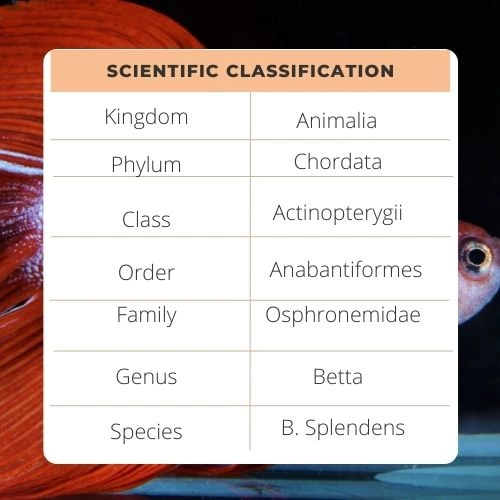Betta fish, also known as Siamese fighting fish, are the most colorful and elegant species of freshwater fish. These fish have long fins and bright colored bodies.
The betta fish’s beauty and ease of care have made this species very popular, especially among new aquarium hobbyists. Unfortunately, there are many common misconceptions about this species that lead people to not care for them properly.
Scientific Classification:

| Kingdom | Animalia |
| Phylum | Chordata |
| Class | Actinopterygii |
| Order | Anabantiformes |
| Family | Osphronemidae |
| Genus | Betta |
| Species | B. Splendens |
| Binomial name | Betta splendens |
See if you can answer these questions:
True or False: In nature, bettas live in small puddles and actually like to live in small spaces?
Answer: False. Siamese fighting fish are found in rice paddies, ponds, and slow-moving streams, found in Asia. It is true that Betta fish can sometimes be found in puddles as large bodies of water begin to dry up, but this is not their ideal environment.
Like most living creatures, they like to have plenty of space to roam. If you transfer a betta from a small cup to a larger aquarium, they will happily explore every inch of their new tank and you will see their coloration improve dramatically.
There is some debate about the minimum amount of space a single betta needs, usually between 1 and 5 gallons. I would not put less than two of mine, five is preferable.
Read More: Top 9 different types of Barb fish | tank size, life, PH
True or False: Bettas can breathe air, so they don’t need filters?
Answer: It’s a bit more complicated. Siamese fighting fish have a labyrinth organ that allows them to breathe air from the surface of the tank. This helps them survive in low-oxygen water.
So, it is true that bettas can breathe air to some extent and actually need to breathe air from the surface of their tank to survive. But that doesn’t mean you don’t need a better filter.
We have to make a distinction between survival and prosperity. Just because your betta survives on two cups of water without a heater or filter doesn’t mean he’s thriving. Bettas are very hardy fish that can survive much longer than other fish species in poor conditions, but keeping them in such a stressful environment is inhumane.
Here’s another consideration: Because of the longer, flowing fins of the betta, they don’t work well in the strong currents that some filters make. This is especially a risk in smaller tanks where it is more difficult to escape currents.
It’s also important to remember that bettas are tropical fish and will need a heater unless you keep your house at a constant 80 degrees. Heating less than five gallons of water is generally unsafe—another argument for giving your betta more room to roam.
Read More: Shrimp Bengali Meaning | Shrimp Names Different Language
True or False: Will Male Siamese fighting fish Fight to the Death When Put in the Same Tank?
Answer: This one is true. Male bettas are very aggressive with their own species and should never be kept with other bettas, male or female.
They are called Siamese fighting fish for a reason! In fact, keeping a male betta in a tank with any other fish is somewhat risky. They can be aggressive towards other fish, especially anything like another betta.
On the other hand, they tend to be picked off by fast moving and/or nippy fish. Some people manage to successfully keep a male betta in a community tank, but I’m not willing to risk it on myself.
My boys each get half of the ten gallon tank to themselves and are very pleased. Tank dividers are available at most pet stores if you want to turn a ten gallon tank into two fives, placing a male Betta in each half.
I found this set up to be ideal. Female Siamese fighting fish are another story. They are relatively peaceful with each other and can usually be combined in a peaceful community tank.
True or False: Betta fish prefer cold water so they don’t need a heater?
Answer: There are several mistakes in this statement.One important thing, betta fish comes from a warm natural environment so they would not prefer cold water.
The ideal temperature range for Betta fish is between 72°F and 82°F. Unless you keep your house very warm, your betta tank will probably need to be heated to keep within this temperature range.
Addressing the myths surrounding tank size, you should note that it is unsafe to use an aquarium heater in a tank smaller than 5 gallons. In this case, you need to keep your betta fish in a tank large enough that you can safely warm it.
Aquarium heaters come in a wide range of different sizes, so be sure to choose one that properly matches your tank.
True or false: Live food and frozen food are too rich for betta fish – do they just need a knife?
Answer: The best staple food for betta fish is betta pellets – they are specially formulated to meet the basic nutritional needs of betta fish. Betta fish only need a few pellets per day – overfeeding will reduce water quality which can be very bad for your fish.
There is no truth to the idea that live food and frozen food are too rich for betta fish. All species of aquarium fish need a varied but balanced diet to thrive and this is true for betta fish. But you have to be careful about how much food you give your fish.
If you offer live or frozen food to your betta fish one day, skip the pellets. Plan to give your betta fish a variety of food by keeping it as its main diet and supplementing with other foods a few times a week.
Bettas are one of my favorite fish species. There are different types of tails in different colors, making it difficult to choose just one. I’ve been pleasantly surprised with my female bettas, who look dull in the small, dirty cups that are usually stocked at pet stores.
Once they’re in a better environment, they’re downright brilliant, easily rivaling males in color. Bettas are beautiful, hardy, and easy to care for. If properly maintained, they can be enjoyed for years.

